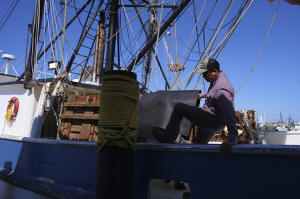Meet the Gulf shrimpers rooting on Trump's tariffs in a Texas fishing
town
[April 11, 2025] By
LEKAN OYEKANMI and JIM VERTUNO
PALACIOS, Texas (AP) — While American consumers and markets wonder and
worry about President Donald Trump's on-again, off-again tariffs,
there's one group cheering him as they hope he'll prop up their sinking
business: Gulf coast shrimpers.
American shrimpers have been hammered in recent years by cheap imports
flooding the U.S. market and restaurants, driving down prices to the
point that profits are razor thin or shrimpers are losing money and
struggling to stay afloat.
Tariffs, they hope, could level the playing field and help their
businesses not just survive but thrive.
“It’s been tough the last several years that we’ve tried to fight
through this," said Reed Bowers, owner of Bowers Shrimp Farm in
Palacios, Texas. Tough times meant difficult choices for many. "Cutting
people off, laying people off, or reduce hours or reduce wages ...
whatever we can do to survive."
Foreign competition
Since 2021, the price of imported shrimp has dropped by more than $1.5
billion, according to the Southern Shrimpers Alliance trade association,
causing the U.S. shrimp industry to lose nearly 50% of its market value.
The shrimpers alliance complains that the overseas industry has
benefitted from billions of dollars invested in shrimp aquaculture,
cheap or even forced labor, use of antibiotics banned in the U.S., and
few or no environment regulations.
More than 90% of shrimp consumed in the U.S. is imported, according to
the alliance.
“I’m not a believer in free trade. I’m a believer fair trade,” Bowers
said. "So if you’re gonna sell into the United States, I think it’s very
important to get the same rules and regulations that I have to have as a
farmer here in the United States.”
Craig Wallis, owner of W&W Dock & Ice, has been in the business since
1975 and noted that back then shrimpers would run their trawlers 12
months a year.
Not anymore. That's no longer affordable as Gulf shrimpers compete with
cheaper product coming in from South America, China and India.
Wallis says he's only able to run his shrimp boats about half the year,
yet “the bills keep coming every month.”
"We don’t get any subsidies here. We don’t need any help from the
government. What we get for our product is what we have to make it on,”
he said.
Wallis, who noted he voted for Trump, has watched the back-and-forth on
tariffs in recent weeks.
[to top of second column] |

Ken Garcia, manager of Quality Seafood, jumps off of a friend's
shrimpp boat, Wednesday, April 9, 2025, in Palacios, Texas. (AP
Photo/Eric Gay)
“I don’t know where the tariffs are
going to be settled at," he said, “but it’s definitely going to
help."
The rising costs of tariffs
But Trump's tariffs will also force shrimpers to balance the higher
costs of equipment, such as trawl cables, webbing, chains and
shackles. Some of those items have recently been increasing in
price, Wallis said.
"We got be careful that there’s a good balance,” he said.
If the American shrimping industry collapses, Wallis sees a future
where foreign trawlers are operating in the Gulf of Mexico, which
Trump renamed the “ Gulf of America. ”
“I’m hanging on to have something when I retire,” said Wallis, who
is 72. “If it keeps going like it is, it’s taken away from my
retirement that I’ve worked for all my life.”
Buying local
Phan Tran's family used to be shrimpers but quit the boats around 25
years ago to open Tran's Family Restaurant, a place they literally
built themselves.
“It was just my dad, me and one welder,” Tran said.
Tran said he doesn't want to serve imported shrimp to his customers.
He doesn't know what shortcuts foreign shrimper firms take.
“The taste, the size, you could tell the texture of the shrimp,
everything. ... Domestic shrimp versus imported shrimp, you could
tell the difference,” Tran said, adding he'll be buying straight
from the day's catch at the dock, “as long as we have the restaurant
business.”
Tariffs will help keep the market fair for local shrimpers, Tran
said.
“We used to have a sign on our window here that says, ‘friends don’t
let friends eat imported shrimp,’" Tran said. “And a few people got
a little offended by it, so we had to take it off. (But) that's a
true statement that we stand by here.”
Bowers, the shrimp farm owner, hopes seafood tariffs have a positive
ripple effect across the industry for American producers.
“I think the price of imported seafood is gonna come up," he said.
“And as that price comes up, it’ll make our seafood, our shrimp,
more affordable for everybody else.”
___
Vertuno reported from Austin, Texas.
All contents © copyright 2025 Associated Press. All rights reserved |